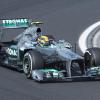Was thinking whether I should post this or not, but why not? ![]()
Journal of Quantitative Analysis in Sports. These authors have looked at the drivers since 1950 and came up with this analysis.
There are some surprises in there. Please make sure to read the abstract at the beginning to understand methodology and objective:
This paper uses random-coefficient models and (a) finds rankings of who are the best formula 1 (F1) drivers of all time, conditional on team performance; (b) quantifies how much teams and drivers matter; and © quantifies how team and driver effects vary over time and under different racing conditions. The points scored by drivers in a race (standardised across seasons and Normalised) is used as the response variable in a cross-classified multilevel model that partitions variance into team, team-year and driver levels. These effects are then allowed to vary by year, track type and weather conditions using complex variance functions. Juan Manuel Fangio is found to be the greatest driver of all time. Team effects are shown to be more important than driver effects (and increasingly so over time), although their importance may be reduced in wet weather and on street tracks. A sensitivity analysis was undertaken with various forms of the dependent variable; this did not lead to substantively different conclusions.
Full analysis here:
https://www.research...mance_1950-2014
Edited by statman, 14 April 2016 - 09:16.









































